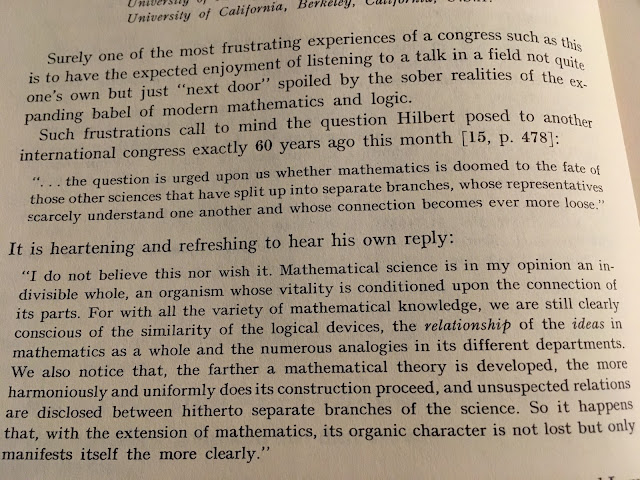Benedikt Loewe has done a great job of finding all the official information about the DLMPS congresses. And if you're only interested in the hard, concrete facts you can make your way to the page of Past Congresses and be done. My intention here is to discuss the fluffy side of some of the meetings, just for fun.
The first meeting at all was the
1st International Congress of the Division of Logic, Methodology and Philosophy of Science, Stanford University 1960
- 24 August-2 September 1960, Stanford, California.
- Executive and program committees
- Publication: Logic, Methodology and Philosophy of Science: Proceedings of the 1960 International Congress, edited by Ernest Nagel, Patrick Suppes and Alfred Tarski, Stanford University Press, Stanford CA 1962, 672 pages.
- General Assembly minutes
- Communications of the DLMPS/IUHPS ("Bulletin No. -4"): Synthese 14(4):330-340 (1962).
Now the Dept of Philosophy of Stanford has a nice history where we can read about the Suppes era, when the first congress happened. They say:
Suppes’ indelible presence in the Department spanned sixty-four years (42 years on the full-time faculty, after which he remained deeply engaged as Emeritus Professor until his recent death in 2014). His foundational work across numerous fields in philosophy and in the sciences earned him many honors, including membership in the National Academy of Sciences, the National Medal of Science, and the Lakatos Award.
First I thought my fluffy story about this conference would be the "mystery" in the preface where the editors say: Due to unforeseen circumstances, Professor Nagel was forced to resign as Chairman of the Organizing Committee just prior to the opening of the Congress, and Professor Tarski served in that capacity during its sessions.
This is good, we can conjure up a whole murder mystery on that "forced to resign", right?
But then looking at some of the papers (the book with only invited papers has 672 pages!) I discovered something much fluffier. For me at least. Here it is:
This is J. W. Addison talking about the "expanding babel of modern mathematics and logic". And bringing Hilbert into the picture to explain that Mathematics is an indivisible whole, a connected organism that as farther as it's developed, the more we can see the harmony between its parts.
This is pink-unicorn kind of fluffy, as far as I'm concerned!




No comments:
Post a Comment